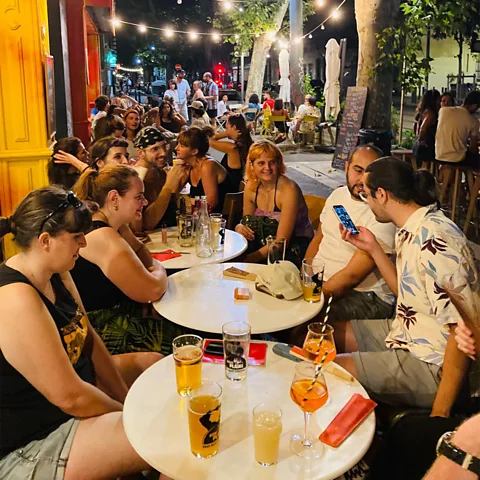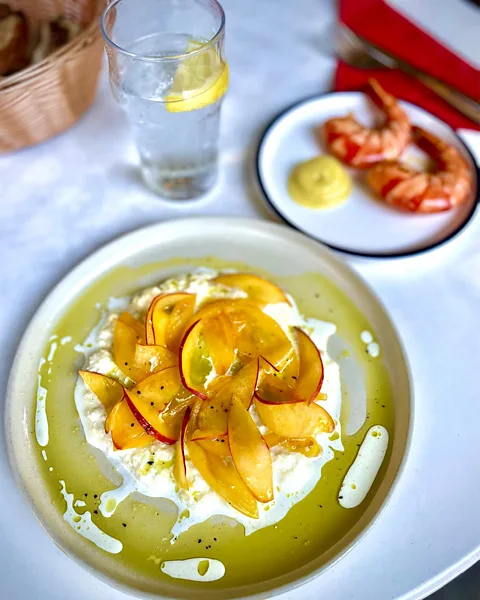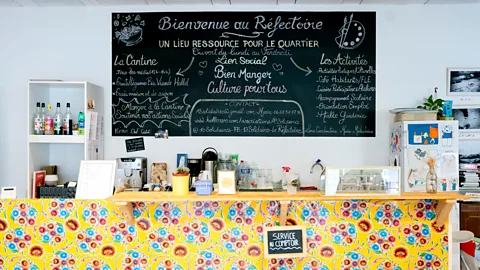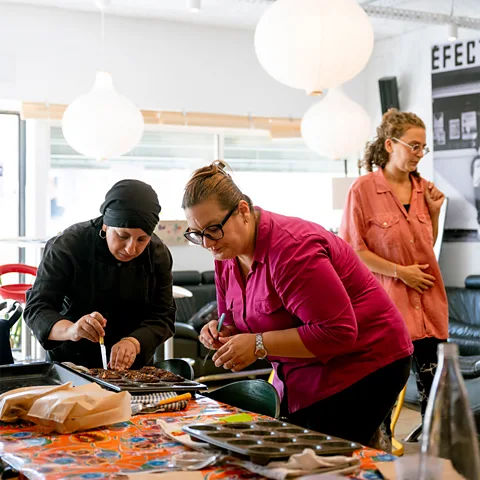The French city where you can eat gourmet food for €1
 Caroline Dutrey
Caroline DutreyIn Marseille, France’s most diverse city, a new wave of restaurants is redefining fine dining by blending haute cuisine with community solidarity.
Behind the ornate facade of Marseille restaurant Le République, lunch service is in full swing. Smoked mullet with sea fennel butter arrives as a starter, invoking the salty history of France's second city. Hay-smoked cheese with rice flour follows, singing with flavour from the surrounding Provençal countryside. Tourists and locals savour organic ingredients prepared by Michelin-starred chef Sébastien Richard.
But Le République is a gourmet restaurant with a few big differences. First, the staff include a recently released prisoner. Second, around 40% of diners will pay just €1 for their three-course feast. And, finally, several diners have never set foot inside a restaurant before.
Le République is a restaurant solidaire – one of around 10 in Marseille – run as a social enterprise in aid of community solidarity. Other examples include L'Après M, a former McDonald's taken over by its redundant staff when the franchise closed. The team purchased the premises and reopened it as a social enterprise, serving gourmet burgers created by a three-star Michelin chef served to the beat of Algerian rap, while operating a free food-delivery service of healthy takeout for people in need.
Marseille's newest restaurant solidaire is Chaleur, which opened in June 2025. When I visited, it was packed with patrons enjoying chilled cucumber soup adorned with clams, figs and roasted pumpkin seeds. A blowout lunch with wine costs around €25 (£21; $29). But if a patron explains that they're in a penurious position, they can enjoy the exact same menu for a tarif suspend – a "suspended rate" – of just €8 (£6.90; $9.29). Across Marseille, prices vary by philosophy. Some, like Le République, partner with charities to subsidise €1 meals, while others, like Chaleur, operate on trust.
 Jade Tordo
Jade TordoChaleur's popularity begs an obvious question: with food this tasty, why not make a profit?
"Benevolence is a selfish way of saying that I want to be fulfilled in what I do," says Chaleur co-founder Raphaël Raynard. "What enriches us is knowing our work is contributing to creating connections and helping people." The team regularly serves espressos to homeless neighbours and recently donated 300 meals to a workers' strike.
Chaleur's co-founder Nausicaa Roux believes Marseille's status as a "lighthouse city" is key to understanding the popularity of restaurants solidaires. Around 2,600 years of migration – including Greeks settlers in classical times to Iberian Jews fleeing the Spanish Inquisition and Armenians in the 20th Century – has made Marseille one of France's most diverse and religiously tolerant cities.
"As a result, there's a real way of living together that I don't think exists in Paris or London," Roux said. "Folks feel duty bound to help the one in five Marseillais who are born abroad. "There is an openness not found in other cities in France."
These emigres didn't arrive empty handed. They carried ingredients like orange blossom water from the Middle East, which is used to make Marseille's iconic navette biscuits. Dates entered Europe via the Vieux Port, the city's ancient harbour, and probably tomatoes and bananas too. The dynamic city dialect includes words in Amazigh, Occitan and Italian, with phrases blending together like a linguistic bouillabaisse, the local fish stew made from imported saffron and regional seafood. Marseille is, quite literally, a global melting pot.
 Jade Tordo
Jade TordoThanks to Marseille's culinary history, food is Marseille's most powerful social tool. Few districts need it more than La Cabucelle, the city's former soap-making area, located high above the Vieux Port. Here, incomes hover around €975 (£849; $1131) per month – some €500 less than the Marseille average – and there's no youth centre or social space. That's why Léna Cardo opened her restaurant-daycare-social space Le Réfectoire, which started serving organic meals in April 2024.
Le Réfectoire's large, white-washed interior is a restaurant, library, nursery and information exchange rolled into one. "Every Monday, we have a history teacher," says Cardo. "She voluntarily gives up her time to teach French history to a dozen mums." Every Tuesday, a counsellor offers employment advice for free. "We can be a place for a parent to learn French or a young adult to find a job."
However, what keeps customers coming back is Le Réfectoire's sublime food. Daily specials cost around €12, with recent offerings including a sea bream fillet on a bed of Provençal potatoes and tabbouleh topped with a goat's cheese galette. On Wednesdays, local chefs originally hailing from countries like Congo and Morocco take turns in the kitchen and share the revenue. Any excess profit is funnelled into local socio-cultural activities.
More like this:
• Is the future of French cheese at stake?
• Marseille: France's 'good natured' city
• The French Riviera's picture-perfect car-free island escape
Travellers are slowly discovering La Cabucelle, with its Moorish facades and Armenian churches. Everyday bar Monday, an epic Marché aux Puces (flea market) bustles with antiques, home clearance treasures and vintage Olympique de Marseille football jerseys. Cardo hopes they will book Le Réfectoire when they come. "If you're buying something here," she says, "you give money for activities to people who need them."
 Caroline Dutrey
Caroline DutreyThe walk from La Cabucelle to Marseille's rejuvenated docklands feels like a veritable world tour. E-scooters flit like barracudas through streets serving Tunisian lablabi soup and Comoran breadfruit crisps. An influencer could hook 1,000 followers with snapshots of Laotian spring rolls and staircases painted in colourful rainbows. In the docks themselves, ferries make nightly runs to Tangier, Tunis and Algiers, while container ships arrive from around the world.
Back at Le République, chefs are preparing evening starters like leek vinaigrette with a Parmesan biscuit and grated bottarga. Aside from serving €1 meals to diners in need of nutritious cuisine, the restaurant's central theme is "insertion professionnelle" – helping marginalised people back into work.
"[We've employed] people with autism, single mothers who haven't been able to work for 20 years, people who can't read," says Sylvain Martin, who co-founded the restaurant with chef Sébastien Richard. "We have had so many profiles that I can't list them all!"
Some staff have come to Le République from Baumettes Prison, Marseille's toughest jail, where the last person in the Western world to be executed by guillotine took place in 1977. The prison is now home to Marseille's most curious restaurant solidaire, Les Beaux Mets, which translates as "the beautiful dishes" and is a play on the maximum security penitentiary's name. The fine-dining restaurant, open for lunch only, was created by the godfather of Marseille cuisine, Gérald Passedat (also the brains behind the L'Après M's gourmet burger) after learning that former offenders tended to return to crime in the absence of meaningful work.
 Caroline Dutrey
Caroline Dutrey"Taking people from Baumettes is one of the hardest insertions we have," admits Martin. "They say yes to anything until the judge is confident enough to release them." He says that some ex-prisoners fail to show up for work but the ones that apply themselves are "very, very motivated", having learnt teamwork and timekeeping skills behind bars. The prison confirmed that 75% of inmates who trained at the prison restaurant achieved employment or training upon release, thanks in large part to Le République.
The evening service at Le République ends with a turmeric-golden poached pear topped with tongue-numbing Sichuan pepper. There's an unspoken question at the caisse (counter): how can anyone enjoy a €1 dinner?
"We have signed agreements with 100 charities who can book a meal at the price," explains Martin. All patrons receive their bill discreetly after dining together, ensuring dignity for those paying a reduced tariff.
And what if a diner games the system to bag a discount meal?
"If you are selfish enough to cheat, then do it," says Martin. "It's your problem every morning in front of the mirror."
--
If you liked this story, sign up for The Essential List newsletter – a handpicked selection of features, videos and can't-miss news, delivered to your inbox twice a week.
For more Travel stories from the BBC, follow us on Facebook and Instagram.
